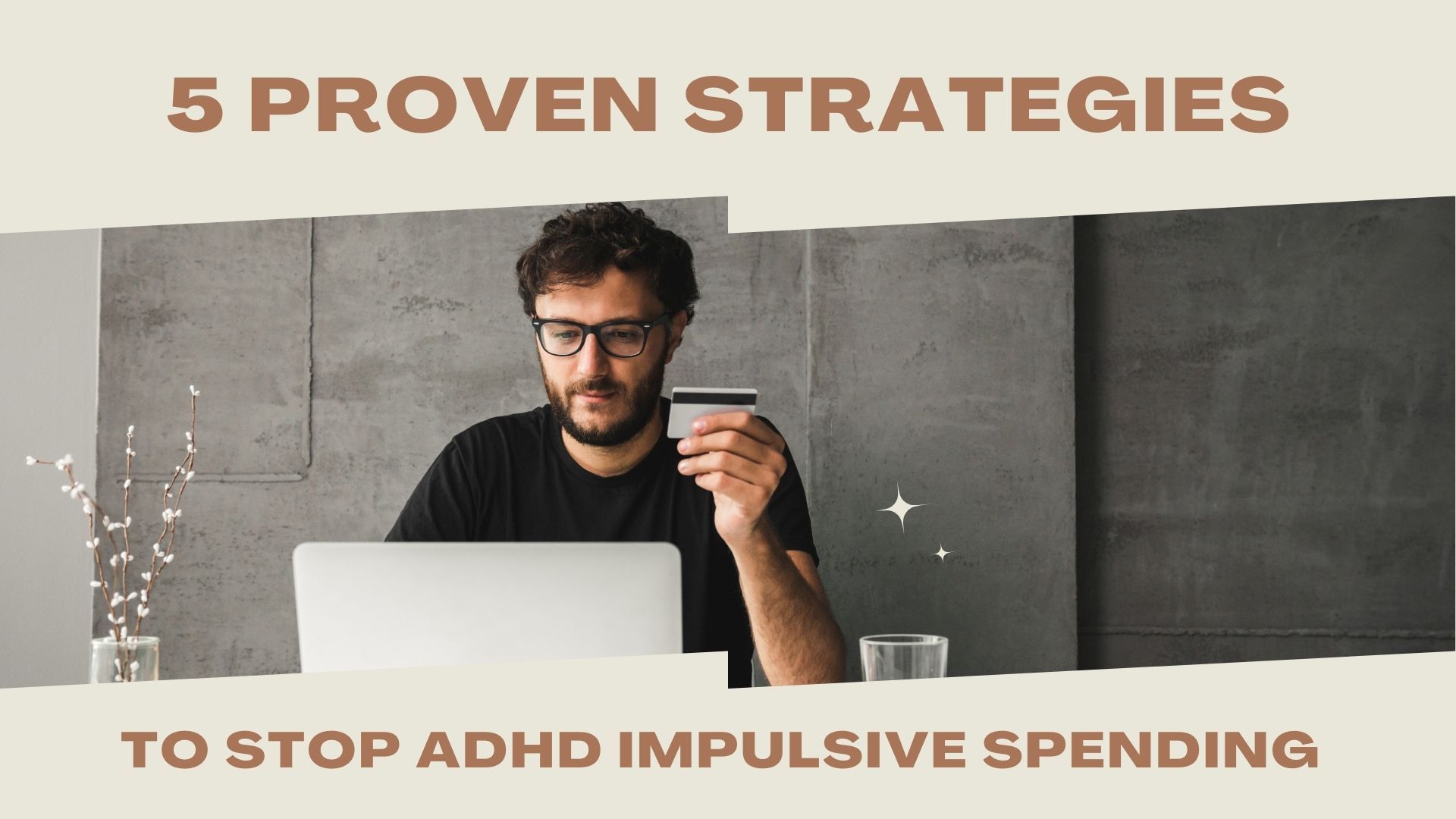5 Proven Strategies to Stop ADHD Impulsive Spending

Ever find yourself making impulsive purchases when you know you shouldn't? It's like your brain operates on its own when it comes to shopping, especially if you have ADHD. But fear not, there are strategies to help you resist these temptations and regain control of your spending habits.
Understanding ADHD and Impulse Buying
Attention Deficit Hyperactivity Disorder (ADHD) affects more than just focus and concentration. It can also influence impulsive behaviours, like impulse buying.
Retail therapy, shopping sprees, and online shopping may provide a temporary high and instant gratification. However, they often lead to regret and financial strain in the long run.
Recognising the connection between ADHD and impulse buying is the first step toward breaking this cycle. By implementing specific techniques and mindfulness practices, individuals with ADHD can learn to better manage their impulses and make more mindful purchasing decisions.
Discover practical ways to resist temptation and take charge of your finances in this insightful guide to overcoming impulsive buying behaviours.
Does ADHD Cause Impulse Buying?
ADHD doesn't directly cause impulse buying, but it can be a symptom of the condition. People with ADHD often struggle with impulsivity, leading to actions like buying on a whim.
Lower dopamine levels in individuals with ADHD can make shopping a way to seek a dopamine rush, intensifying impulsive spending habits. Decision-making can be challenging for those with ADHD, making it hard to plan purchases and think about the consequences.
Research using brain imaging has shown that variances in the brain regions responsible for rewards and decision-making can impact hyperactivity and impulsivity in individuals with ADHD. This can potentially contribute to increased impulsive spending.
Multiple studies have established a direct correlation between ADHD and impulse buying behaviours, pointing to impulsivity as a defining symptom of ADHD. By gaining a deeper understanding of how ADHD affects impulsive spending habits, individuals can effectively develop strategies to manage these tendencies and enhance their financial well-being.
Strategies to Help You Resist Impulsive Buying
Managing impulse buying is challenging for many, but for those with ADHD, it can pose an even greater challenge. The combination of impaired inhibition control, dopamine-seeking behaviour, and difficulties with managing delayed gratification can make resisting impulse spending a real struggle.
However, there are strategies and techniques that can help individuals with ADHD navigate the temptations of impulsive shopping and make more mindful spending decisions. Here are 16 tips that can help you resist the urge of impulse purchases:
1. Use a Shopping List
Using shopping lists is a highly effective strategy for curbing impulse buying. By creating a detailed list of items needed before heading to the store, we are less likely to be swayed by tempting displays or discounts on unnecessary items.
A shopping list helps us stay focused on essential purchases and prevents us from making impulsive decisions based on emotion, external triggers, and the need for a dopamine rush. By sticking to our list, we can ensure mindful spending on each shopping trip and make progress towards our long-term financial goals without excessive spending.
2. Unsubscribe from Newsletters and Promotional Emails
Unsubscribing from newsletters and promotional emails is a powerful strategy for curbing impulse buying and cultivating mindful spending habits. The constant bombardment of tempting offers and sales in our inboxes can easily lead us astray, causing unnecessary purchases.
By opting out of these emails, we can reduce the constant reminders of potential purchases and ultimately resist the temptation to spend impulsively. This deliberate action limits our exposure to triggers, enabling us to take better control of our spending habits and make informed decisions about where to allocate our money.
3. Delay the Impulse to Spend with a 24-Hour Timer
Using a 24-hour timer helps manage impulse buying and ADHD symptoms. This technique creates a gap between the urge to purchase and the actual buying, allowing time for evaluation.
By incorporating this timer, we can resist impulsive purchases that don't fit our budget or financial goals. Using the 24-hour timer gives us the opportunity to reflect on necessity and alignment with long-term finances, avoiding falling for tempting sales pitches.
Implementing a 24-hour timer enables deliberate spending decisions, empowering us to regain control and avoid regrets. By waiting 24 hours before making a purchase, you give yourself the opportunity to evaluate whether you truly need the item or if it's just a momentary desire fuelled by dopamine.
4. Use Cash (or Debit Cards) Instead of Credit Cards
Using cash instead of credit cards can be a game-changer when it comes to managing our finances effectively. Swiping a credit card may seem convenient at the moment, but it can lead to overspending and accumulating debt in the long run.
By using cash for our purchases, we have a tangible representation of how much money we're actually spending, making it easier to stay within our budget and avoid unnecessary expenses.
Research has shown that people tend to spend more when using credit cards, as the credit limit becomes the ceiling rather than our actual income. Making the switch to using cash can help us stay mindful of our spending habits and prevent us from living beyond our means.
Incorporating a "weaning period" of at least three months, where we only use debit cards and cash, can help us break the habit of impulsive spending using credit cards and build awareness of our financial behaviours. Making the switch to using money that we actually possess (like cash and debit cards) can be a powerful tool in taking control of our finances and reducing impulse shopping.
5. Start Budgeting and Give Yourself an Allowance That You Can Spend Impulsively
Budgeting is a crucial aspect of managing finances, especially for individuals with ADHD who may struggle with impulse buying and overspending. By creating a budget, you can set limits on how much you can spend and allocate your money towards different categories such as groceries, bills, and entertainment. This helps in keeping track of your expenses and ensures that you are not spending more than you earn.
One important aspect of budgeting is allocating yourself an allowance that you can spend without planning. This allowance can be set aside for discretionary spending on things like dining out, shopping, or entertainment. By giving yourself a set amount to spend freely, you can satisfy your impulses without derailing your overall financial plan. This can help with curbing impulsive buying tendencies and staying within your budget.
To make budgeting even more engaging, you can try our fun budgeting app designed specifically for people with ADHD. It transforms the process into an enjoyable game of swiping your transactions into Needs and Wants, giving you the dopamine hit without the overwhelm and paralysis often associated with traditional budgeting methods. This innovative approach not only helps you stay on track financially but also makes managing money a fun and rewarding experience.
Take the Impulse Purchase Quiz Before Buying
Taking a moment to reflect on our purchasing decisions can make a significant difference. Instead of instantly hitting the "buy now" button, let's evaluate our decision using our Impulse Purchase Calculator quiz.
This interactive and efficient quiz is specifically designed to assist us in determining if a potential purchase is truly worth it. By answering a set of simple yes-or-no questions, we can gain valuable insight into our buying motivations and evaluate whether the item aligns with our financial goals and needs.
The quiz eliminates the guesswork from shopping and provides a structured approach to making purchasing decisions. It prompts us to consider factors such as necessity, financial impact, and emotional triggers, enabling us to make more informed and intentional choices.
By utilising this tool, we can resist impulsive urges and ensure that our spending is in line with our long-term objectives. Why not give the Impulse Purchase Calculator a try the next time we feel tempted to make an unplanned purchase? It might just save us from experiencing buyer's remorse and help us maintain better control over our finances.
Conclusion
Taking control of our impulsive buying is about securing our financial future and well-being, especially for those of us with ADHD. By using strategies like shopping lists, unsubscribing from promotional emails, employing a 24-hour timer, and opting for cash instead of credit cards, we can reduce impulsive spending.
Budgeting and setting a spending allowance can also help manage our finances more effectively. Remember, overcoming impulsive buying is a journey. Each mindful step we take brings us closer to healthier financial habits.
Let’s embrace these strategies, celebrate our progress, and take charge of our finances with confidence. Our future selves will thank us.
